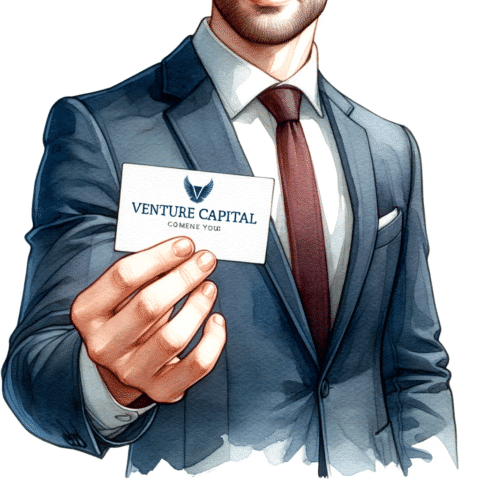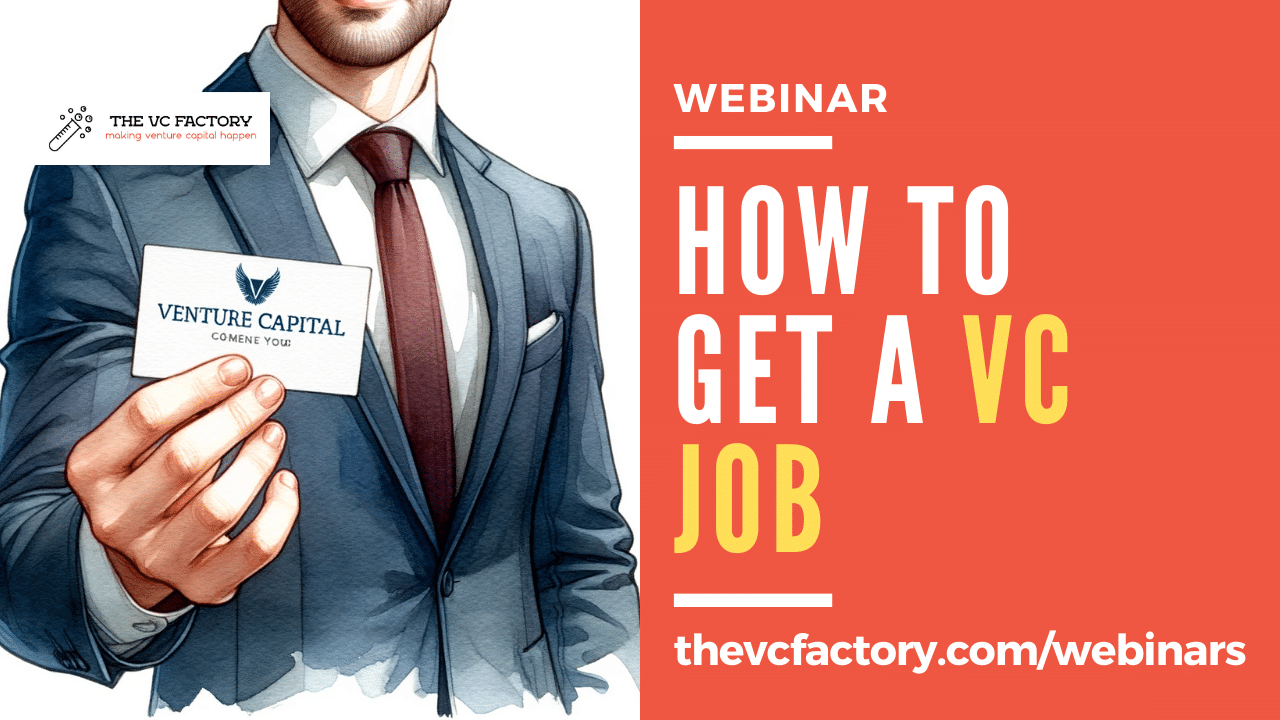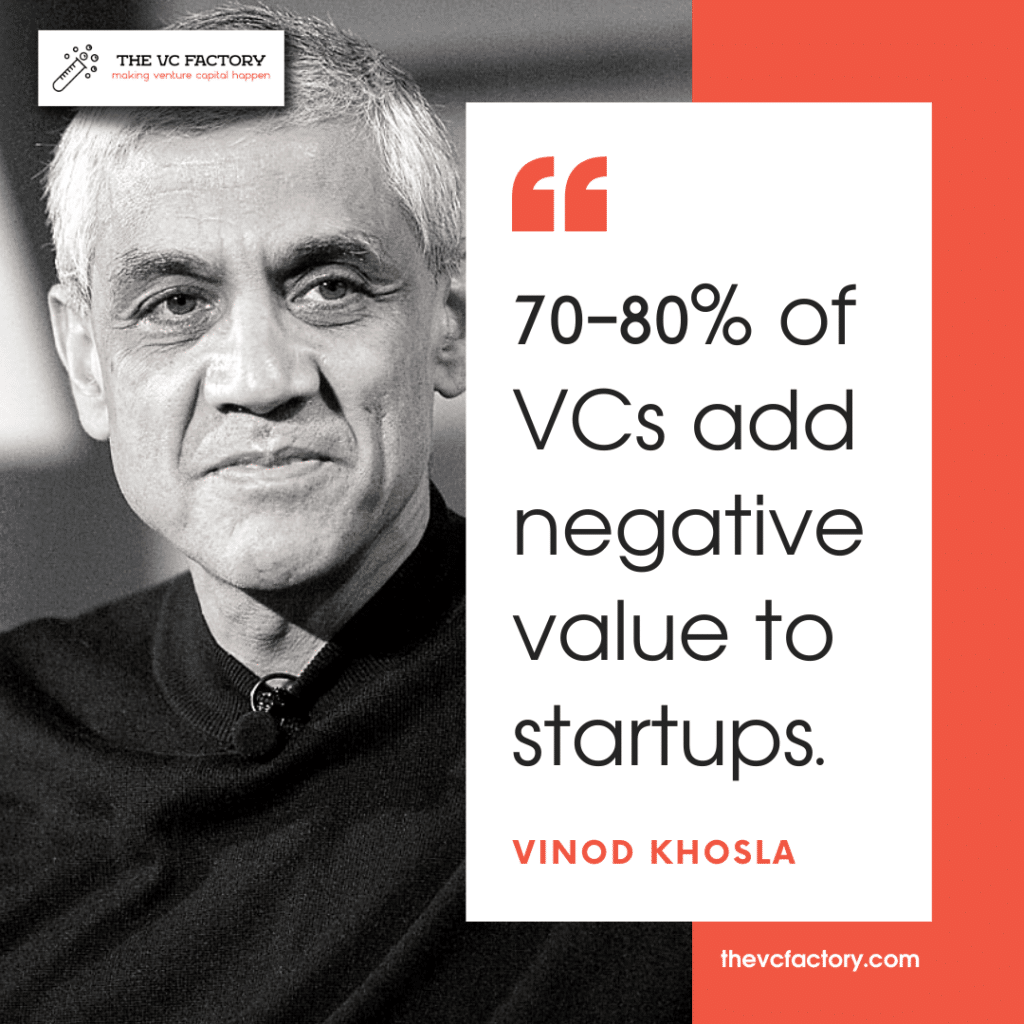7 Steps To Land A Venture Capital Job
- 27.0K views
- 15 minute read

Jobs in Venture Capital are notoriously hard to land. They don't come by often, and they are seldom advertised—except in large VC firms, mainly for entry-level positions. Aspiring VCs often don't understand Venture Capital well enough to apply at the right type of firm or one that is interested in their skillset. They also struggle to get interviews for a Venture Capital job and frequently fail the technical part of it (the VC case study). I've recruited and trained dozens of VC applicants over the years. I share my tips & tricks from that experience and best practices from interviews with Venture Capitalists worldwide.
In this guide and the companion webinar, I cover the critical points you need to know to get your Venture Capital job: key aspects of the role, what skills and prior experiences VC recruiters look for, when to apply, how to land an interview with Venture Capitalists and transform it into a job. I also show you how to build a mousetrap that is so effective, that you'll be top of mind at your dream Venture Capital firm next time there is an opening.
In This Post
- Step 1. Make The Most Of The Opportunity
- Step 2. Know What You Will Do On The Job
- Step 3. Sell Your Past Experience Adequately
- Step 4. Build Competencies Needed For A Venture Capital Job
- Step 5. Apply At the right time
- Step 6. Get An Interview For A Venture Capital Job
- Step 7. Prepare For The Interview(s)
- Conclusion: tl;dr
Accelerate Your Learning: Watch Our Webinar!
Don’t just read about it, immerse yourself in the content through our companion webinar for this post! Engage with a multimedia presentation, discover all the referenced sources, and have your questions answered live! Click the “Watch Now” button to access the webinar. (Members: click here).

Step 1. Make The Most Of The Opportunity
The first myth to debunk is that there's a VC job waiting for you in every corner, and you just have to pitch an Investor to get one. Although the last five years saw an unprecedented level of dollars raised by VC firms and invested in startups, Venture Capital remains an exclusive asset class in terms of job openings.
The Crunchbase-based analysis I mentioned in the webinar (at 4'30) clearly shows that, although there are thousands of VC firms, the top 100 make a large portion of the investments. In reality, most Venture Capital firms are top-heavy structures with a couple of partners and few junior resources—mostly interns. The solo GP (for General Partner, i.e., the Investor) trend has further polarized the industry's structure, and while some of them are hiring, many are happy to remain nifty and thrifty.
The main reason for such partner-heavy structures is the remuneration mechanism en vogue in Venture Capital. Fund managers typically perceive 2% of their fund's size in annual management fees, which helps them pay for salaries, rent, and other expenses. Except in megafunds, GPs derive the bulk of their wealth—when they make any money at all—from something called carried interest: a profit-sharing scheme on the value they create when they liquidate their startup portfolio.
The article below addresses the VC pay structure. It's important to know how VC funds work when applying for a job in Venture Capital.
Venture Capital jobs are scarce, and the competition for them is fierce—which is why you need to build a mousetrap to get one. Your objective as an Aspiring VC is to be top of mind at your dream VC firm when a job finally opens.
Naturally, it is possible to apply to job openings posted on various platforms. As I know first-hand from my students at HEC Paris and alumni of the VC Career Accelerator, the odds of success are very low. I recently shared a VC job post that had received over 450 applications. This is the least effective way to break into Venture Capital.
Getting the interview is a good first step, but you need to demonstrate more than enthusiasm to be hired. Mastering the VC game, to paraphrase Jeff Bussgang's book's title, is a prerequisite. This post and companion webinar will help you get in the right direction.
Step 2. Know What You Will Do On The Job
Just like any other interview, it's critical to have a good understanding of your future tasks to convince recruiters—in this case, the firm's partners—that you're ready to hit the ground running.
You'll most likely fall into one of three categories depending on your seniority and the VC firm's structure:
- Analyst: Entry-level positions are typically suited for professionals with less than two years of experience
- Junior Partner: Venture Capital firms rarely use as many intermediate levels as investment banks or consultancies, where the path from analyst to partner (or managing director) goes through several steps including associate, vice-president, and principal. Junior partners typically have around 5-7 years of relevant experience. It is not common for VC firms to recruit at that level
- Partner: Outsiders who make it to partner generally possess the expertise the VC firm needs to raise a specific fund. I regularly train professionals with fifteen to twenty years of work experience who are totally new to Venture Capital. They typically co-lead a fund with one of the firm's long-term partners
I use a framework called the Venture Capital cycle to train Aspiring VCs, based on the 1999 eponymous book by two top Harvard researchers, Paul Gompers and Josh Lerner. VCs continuously go through the same cycle: raise money with external Investors, deploy capital, monitor their startup portfolio, exit these companies (hopefully with a substantial gain), then raise the next fund, and onwards again. In the webinar, I broke down each step in the VC Cycle according to the corresponding seniority level.
As a partner, I review the companies that my junior partners think are important for me to review.
Randy Komisar - Kleiner Perkins (Source: Insead)
Analysts and partners don't work on the same tasks. For example, Kleiner Perkins's Randy Komisar explained that he relies on junior resources to vet a potential investment opportunity. Unless he is referred to a Founder by a "trusted source" from the extensive network he built over the years, he doesn't engage directly in active deal flow sourcing.
Step 3. Sell Your Past Experience Adequately
Now that you know what a Venture Capital career looks like, and what you will be asked to do, you need to demonstrate to your future colleagues that you have what it takes to create value for the firm.
The first question is: What is the best path to a Venture Capital job?
A common answer is an entrepreneurial background. I've recently shared videos of VC legends such as John Doerr and Vinod Khosla making this point.
I think it's important for successful venture investors to be entrepreneurs.
John Doerr - kleiner Perkins (Source: Bloomberg)
However, after reviewing data from the 2019 Midas List—Forbes's annual ranking of the top 100 VCs worldwide—I concluded that having an entrepreneurial background was far from guaranteeing a spot on the list. Only 25% of the 2019 laureates had been entrepreneurs. A whopping 37% had no prior operational experience at all. They came from finance, consulting, and other job types.
These results confirm a 2016 analysis of 1,500 Venture Capitalists showing that 59% didn't have any operating experience. Only a minority (28%) had an engineering degree.
Entrepreneurs Are Not Better Investors
In the webinar, I shared the findings of an intriguing academic study that scrutinized data from over 12,000 U.S. Venture Capitalists active between 1990 to 2019. Notably, only 7% of these VCs had an entrepreneurial background, a figure partially attributed to the study's inclusion of only those Founders who had prior VC backing.
The crux of the study revolved around comparing the success rates of VCs, segregating them based on their entrepreneurial experience. The study further categorized the entrepreneurial group into successful and non-successful Founders. In both cases, success was defined as a company having either been taken public or having returned at least the initial investment. The results are compelling:
- VCs who were previously successful Founders recorded a success rate of 30% on their investments, 6.5% higher than their non-entrepreneurial counterparts
- Non-successful Founders-turned-VCs achieved a 19% success rate, about a third lower than successful Founder-VCs and four percentage points lower than VCs without any entrepreneurial experience.
The paper's authors, Paul Gompers and Vladimir Mukharlyamov, attribute the superior performance of successful Founders-turned-VCs to their access to higher-quality deal flow and their ability to provide value to their startup investments. This theory aligns with my belief that success provides a more potent learning experience than failure.
The study confirms that an entrepreneurial background doesn't necessarily promise superior returns. I can corroborate this from personal experience, adding a crucial caveat for Founder-VCs to excel: the ability to distance oneself from past experiences and consider the unique circumstances of the startups they advise. Too often, Founders project their aspirations and fears, remnants of their own ventures, onto others who are navigating distinct entrepreneurial journeys.
The relevance of an entrepreneurial background also varies based on the stage at which VC firms deploy capital. Early-stage VC firms value prior entrepreneurial work because they pride themselves on helping Founders navigate the vicissitudes of growing a company. At the late stage, your professional network, vertical expertise, and financial savviness may matter more.
Watch my interviews with active Venture Capitalists across the globe to better understand which type of firm to target, and what will be expected of you. You'll find them in the section called The VC Diaries.
How to test your background for a Venture Capital job?
Before you invest considerable time in getting job interviews, make sure you have what it takes. There are two easy ways to ensure your experience is suited for a career in Venture Capital.
The first one is to use LinkedIn to search for "lookalikes" who already made it to a VC firm. Let's say you're an industrial engineer with 10 years of professional experience in your field and a degree from a middle-of-the-pack university. You can leverage LinkedIn to find Investors with a similar background in your geographical area. If you find any, you may be able to get in touch with them, given the similarities. (Scroll down to Step 6 to learn how to effectively engage VCs on social media).
Another way to ascertain whether you're on the right path is to browse the Team page of VC firms you're considering applying to. Venture Capital is one of the rare industries in which professionals want to be known and reached: the next unicorn could be around the corner.
I added more tips to check your compatibility to a VC career in the article below.
You've reached a Members-only area.
Unlock Full Access
Discover exclusive content curated for Venture Capital professionals and enthusiasts. Join our community and gain unlimited access to in-depth articles, expert guest interviews, MBA-level webinars, and networking opportunities.
Register for our 7-Day Free Trial: Click Here
Already a member? Please Log In Below:
Subscribe to our Newsletter
Join 12,000+ VCs & Founders globally who enjoy our weekly digest on Venture Capital. We keep your information confidential and you can unsubscribe at any time. Sweet!


